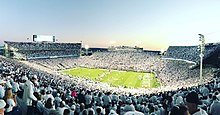
Back Beaver Stadium German Beaver Stadium Spanish Beaver Stadium French ビーバー・スタジアム Japanese Beaver Stadium Polish Beaver Stadium Portuguese 比佛球场 Chinese
 Beaver Stadium prior to Penn State's September 29, 2018 game against visiting Ohio State set an all-time stadium attendance record with an announced crowd of 110,889. | |
 | |
| Address | 1 Beaver Stadium University Park, Pennsylvania U.S. |
|---|---|
| Location | Pennsylvania State University |
| Operator | Pennsylvania State University |
| Type | Stadium |
| Genre(s) | Sporting events |
| Seating type | Stadium seating |
| Executive suites | 60 |
| Capacity | 106,572 (2011–present)
Former capacity: List
|
| Record attendance | 110,889 (2018 vs. Ohio State) |
| Surface | Natural grass |
| Scoreboard | Yes |
| Construction | |
| Broke ground | 1959 |
| Opened | 17 September 1960 Capacity 69,000 |
| Renovated | 2014 Scoreboards changed 2008 Marquee boards added 2001 1985 Walkways and ramps added 1984 Lights added |
| Expanded | 1969, 1972, 1976, 1980, 1985, 1991, 2001, 2011 |
| Construction cost | $1.6 million[1] ($16.5 million in 2023 dollars[2]) $93 million (2001 expansion) |
| Architect | Michael Baker Jr., Inc.[3] HOK Sport (2001 expansion) Populous (2024-2027 renovation)[4] |
| Project manager | Barton Malow, AECOM Hunt, Alexander Building Construction (2024-2027 renovation)[4] |
| Tenants | |
| Penn State Nittany Lions (NCAA) (1960–present) | |
| Website | |
| gopsusports.com/beaverstadium | |
Beaver Stadium is an outdoor college football stadium on the campus of Pennsylvania State University in Penn State University Park. It has been home to the Penn State Nittany Lions of the Big Ten Conference since 1960, though some parts of the stadium date back to 1909. It was also the site of university commencements until 1984.[5] The stadium, as well as its predecessors, is named after James A. Beaver (1837–1914), a governor of Pennsylvania (1887–91), president of the university's board of trustees,[6] and native of nearby Millerstown. Officially, the stadium is part of the municipality known as College Township, Pennsylvania, although it has a University Park address.
Beaver Stadium has an official seating capacity of 106,572,[7] making it currently the second largest stadium in the Western Hemisphere and the fourth largest in the world. Its natural grass playing field is aligned northwest to southeast at an approximate elevation of 1,150 feet (350 m) above sea level.
Beaver Stadium is widely known as one of the toughest venues for opposing teams in collegiate athletics. In 2008, it was recognized as having the best student section in the country for the second consecutive year. In 2019, it was named student section of the year by a committee of ESPN broadcasters and writers.[8][9]
In 2016, Beaver Stadium was voted the number-one football stadium in college football in a USA Today poll, garnering over 41 percent of the vote.[10] In March 2019, USA Today conducted another poll asking voters to decide the best stadium in the United States during "Bracket Madness", which coincided with the 2019 NCAA basketball tournament. Hundreds of thousands of fans voted for their favorites throughout the week. In the championship match-up, Beaver Stadium beat Kansas’ Allen Fieldhouse to claim the title of Ultimate Stadium.[11]
Beaver Stadium was the first to have its interior included in Google Street View.[12]
- ^ "Beaver Stadium History Essay". Retrieved January 14, 2016.
- ^ 1634–1699: McCusker, J. J. (1997). How Much Is That in Real Money? A Historical Price Index for Use as a Deflator of Money Values in the Economy of the United States: Addenda et Corrigenda (PDF). American Antiquarian Society. 1700–1799: McCusker, J. J. (1992). How Much Is That in Real Money? A Historical Price Index for Use as a Deflator of Money Values in the Economy of the United States (PDF). American Antiquarian Society. 1800–present: Federal Reserve Bank of Minneapolis. "Consumer Price Index (estimate) 1800–". Retrieved February 29, 2024.
- ^ "Baker Firm designed New Grid Stadium". The Beaver County Times. September 26, 1961. Retrieved September 28, 2011.
- ^ a b "Architect, construction manager, consultant selected for stadium renovations". gopsusports.com. Retrieved 13 April 2024.
- ^ Rushton, Geoff (September 12, 2011) [June 13, 2011]. "Beaver Stadium: The Home of Penn State Football". Penn State News. Retrieved April 22, 2019.
- ^ Musselman, Ron (September 16, 2008). "Why Is It Called Beaver Stadium?". Pittsburgh Post-Gazette. Retrieved September 17, 2008.
- ^ "Facilities". Archived from the original on November 26, 2011. Retrieved January 14, 2016.
- ^ Herbstreit, Kirk (August 25, 2008). "The Nation's Best: Eighth Annual Herbie Awards". ESPN.
- ^ "Live Más Student Section | Taco Bell® | ESPN". promo.espn.com. Retrieved 2021-11-14.
- ^ Best college football stadiums
- ^ Nick Schwartz (March 30, 2019). "Penn State's Beaver Stadium wins the 2019 Ultimate Stadium Bracket". For the Win!. USA Today.
- ^ "Google Maps' Street View captures University Park, including stadium". Penn State Live. January 21, 2010.
© MMXXIII Rich X Search. We shall prevail. All rights reserved. Rich X Search